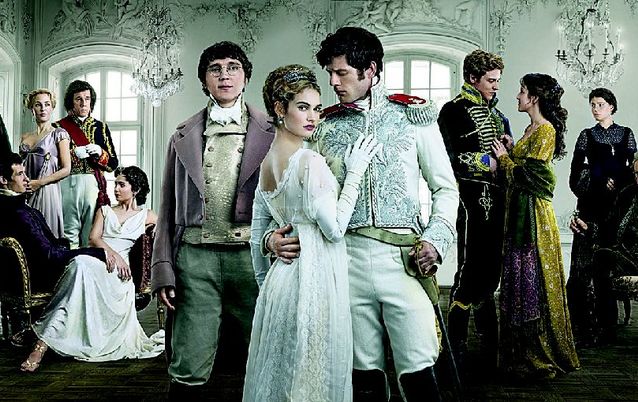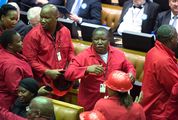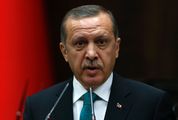MORE than 5-million British television viewers have watched the BBC’s new production of War and Peace on Sunday evenings over the past six weeks.
Russian writer Leo Tolstoy’s classic work has been made accessible to a new generation in a modern parlance. And, rather incredibly for a work written more than 150 years ago, it now tops the bestseller list in many London bookstores.
As the first few episodes were screened, some viewers complained that the dialogue was inaudible. And many apparently did not understand the sequence of the battles. Some were enthralled by the dance scene between Natasha and Andrei. Many were shocked by the gruesome scenes of the Borodino battle. Very few were indifferent.
Paradoxically, it was mostly Tolstoy purists who remained squeamish that any rendition of the great work should make it onto the small screen, seeming to believe that Tolstoy and his characters belong to them alone. Some in this group find it hard to look even at the well-crafted The Last Station, the film about the great writer’s final moments, and remain antipathetic towards any adaptation of the book to film.
Some purists question the graphic incest scenes between Anatole and Helene in the BBC series, which are only rumoured at in the book. But many more viewers were reportedly shocked by Anatole losing his leg at Borodino than those scenes, which must be regarded as progress of some sorts. Tolstoy was no prude when it came to sex.
For millions of people, the work remains a closed book, so to speak. All 1,000 pages of it. Yet many avowed Tolstoyans can attest to its heuristic and therapeutic values. The battles in War and Peace — big and small — often mimic modern life. It remains relevant to this day, as many BBC viewers have discovered in recent times.
For those who still find the prospect of reading the book a daunting task, a few guidelines may help. First, War and Peace is not really a book. Or a novel. It’s an epic, perhaps. Or it can be viewed as a philosophical treatise. Perhaps it is just good storytelling? Or a historiography?
The work is unclassifiable. I think it is more of a religious work, probably on par with the Bible — but that is just my view.
Second, the alleged difficulty in reading the book has been vastly overstated. People often complain that they get confused by the characters. That need not happen.
...
ESSENTIALLY the book is about two noble families — the Bolkonskys and the Rostovs — and an individual (illegitimate) character, Pierre Bezuhov. The Kuragins and Drubetskoys are fringe families, though not of lesser importance. Napoleon and the Tsar are surely familiar to most people.
Tolstoy describes the fortunes of the two families as they cope with the vicissitudes of life. All the other characters — from the peasant Platon, the invader Napoleon, the social climber Boris Drubetskoy to the bad Dolokhov — link up with this main thread.
As War and Peace cannot really be classified into any given genre, it stands to reason that the characters do not neatly fit into literature’s categories, as they are also constantly evolving.
This ebb and flow underscores Tolstoy’s philosophy. His essential message is that nobody can ever be bigger than life itself. Complete happiness will always elude humanity. But so will total unhappiness.
His favourite saying was: greatness cannot exist without goodness, simplicity or truth. The sense of life is life itself. All human endeavour must be judged against this background. But with this apparently simple view, he sketches an immense and intimate panorama of human endeavour, linked to fate. Fate, or free will, is an important factor to Tolstoy. He rejects the view that the high and mighty control life. If that were true, Napoleon would have been victorious. But he died a miserable and lonely death on St Helena island. Why?
Because man’s free will, although limited, is not that insignificant. Every individual action can build up to a collective response, where goodness and truth ultimately prevail.
Tolstoy has astonishing insight into that irrational phenomenon called love. British viewers were rightly indignant when Natasha, the highly spirited Rostov daughter, discarded Andrei for Anatole. But to this day, women often fall for the wrong guy.
Natasha’s infatuation with Anatole is initially languidly described in their encounter at an opera house. She is bored and waiting for Andrei, until she sees Anatole looking at her. Later he comes to the box, but takes little notice of her. She becomes vexed, and hooked.
The contrast between Natasha’s emotions and Andrei’s rational views is still topical. What endures — rationality or emotion? Does the one fear the other?
Once you start reading the book, do not give up. There will probably be way too many incidents to make sense of it all at first. Once you are gripped, start again, read the individual scenes.
War and Peace offers timeless succour in a cynical world. Open the book randomly. You might found yourself on page 541 (Anthony Briggs translation). There appears to be a description of a hunt. The Rostovs are chasing a wolf in the woods. But the wolf is clever and eludes them. After a while another one is killed. But she fought fiercely to the end because she had cubs.
Deceptively simple. Yet full of meaning. Or not, if you wish to read it only as a story about hunting. Or human savagery. Tolstoy is never prescriptive. However, nothing that is written in War and Peace is without significance.
Often a passage of immense suspense or a description of a great event ends with one little sentence. For example, the chapter describing the intense marathon card game between Nikolai and Dolokhov ends with the words: "Nikolai settled his debt in writing with Dolokhov and rejoined his regiment."
...
YOUNG Petya’s tragic death is for many the absolute personification of the futility of war. The now battle-hardened Dolokhov’s words, when he sees the body in the field, are a short "he’s had it", contrasting with the loud wail of Denisov, who was coincidentally (or was it?) in love with Natasha, Petya’s sister.
Politics features, of course. Andrei poignantly plans to reform the army, to make it more effective. Is that possible, or is the "fog of war" the only reality? Andrei is disappointed that nobody in the government wants to implement his reforms. But should he be?
The freeing of Andrei’s serfs is equally inconclusive, contrasting with Pierre’s enthusiastic lifting of their yoke. Pierre then becomes disillusioned with Freemasonry — an analogy which can be linked to ideological extremes that formed later, such as national socialism and communism.
Andrei is a pivotal figure. A proud man wounded at Austerlitz with the standard of his regiment clutched in his hands as he lies on the ground. The victorious Napoleon sees Andrei and says: "That looks like a fine death." Has there ever been a more understated description of a tyrant?
For a Tolstoyan the answer is obvious: there has never been a better written work. Ever. One really only has to read one book in one’s lifetime. By reading War and Peace, you help the world become a better place.

The BBC production of Russian writer Leo Tolstoy’s book, written more than 150 years ago, has been watched by more than 5-million viewers. But there have been complaints about the sex scenes and loose interpretation of the original. Picture: MITCH JENKINS
MORE than 5-million British television viewers have watched the BBC’s new production of War and Peace on Sunday evenings over the past six weeks.
Russian writer Leo Tolstoy’s classic work has been made accessible to a new generation in a modern parlance. And, rather incredibly for a work written more than 150 years ago, it now tops the bestseller list in many London bookstores.
As the first few episodes were screened, some viewers complained that the dialogue was inaudible. And many apparently did not understand the sequence of the battles. Some were enthralled by the dance scene between Natasha and Andrei. Many were shocked by the gruesome scenes of the Borodino battle. Very few were indifferent.
Paradoxically, it was mostly Tolstoy purists who remained squeamish that any rendition of the great work should make it onto the small screen, seeming to believe that Tolstoy and his characters belong to them alone. Some in this group find it hard to look even at the well-crafted The Last Station, the film about the great writer’s final moments, and remain antipathetic towards any adaptation of the book to film.
Some purists question the graphic incest scenes between Anatole and Helene in the BBC series, which are only rumoured at in the book. But many more viewers were reportedly shocked by Anatole losing his leg at Borodino than those scenes, which must be regarded as progress of some sorts. Tolstoy was no prude when it came to sex.
For millions of people, the work remains a closed book, so to speak. All 1,000 pages of it. Yet many avowed Tolstoyans can attest to its heuristic and therapeutic values. The battles in War and Peace — big and small — often mimic modern life. It remains relevant to this day, as many BBC viewers have discovered in recent times.
For those who still find the prospect of reading the book a daunting task, a few guidelines may help. First, War and Peace is not really a book. Or a novel. It’s an epic, perhaps. Or it can be viewed as a philosophical treatise. Perhaps it is just good storytelling? Or a historiography?
The work is unclassifiable. I think it is more of a religious work, probably on par with the Bible — but that is just my view.
Second, the alleged difficulty in reading the book has been vastly overstated. People often complain that they get confused by the characters. That need not happen.
...
ESSENTIALLY the book is about two noble families — the Bolkonskys and the Rostovs — and an individual (illegitimate) character, Pierre Bezuhov. The Kuragins and Drubetskoys are fringe families, though not of lesser importance. Napoleon and the Tsar are surely familiar to most people.
Tolstoy describes the fortunes of the two families as they cope with the vicissitudes of life. All the other characters — from the peasant Platon, the invader Napoleon, the social climber Boris Drubetskoy to the bad Dolokhov — link up with this main thread.
As War and Peace cannot really be classified into any given genre, it stands to reason that the characters do not neatly fit into literature’s categories, as they are also constantly evolving.
This ebb and flow underscores Tolstoy’s philosophy. His essential message is that nobody can ever be bigger than life itself. Complete happiness will always elude humanity. But so will total unhappiness.
His favourite saying was: greatness cannot exist without goodness, simplicity or truth. The sense of life is life itself. All human endeavour must be judged against this background. But with this apparently simple view, he sketches an immense and intimate panorama of human endeavour, linked to fate. Fate, or free will, is an important factor to Tolstoy. He rejects the view that the high and mighty control life. If that were true, Napoleon would have been victorious. But he died a miserable and lonely death on St Helena island. Why?
Because man’s free will, although limited, is not that insignificant. Every individual action can build up to a collective response, where goodness and truth ultimately prevail.
Tolstoy has astonishing insight into that irrational phenomenon called love. British viewers were rightly indignant when Natasha, the highly spirited Rostov daughter, discarded Andrei for Anatole. But to this day, women often fall for the wrong guy.
Natasha’s infatuation with Anatole is initially languidly described in their encounter at an opera house. She is bored and waiting for Andrei, until she sees Anatole looking at her. Later he comes to the box, but takes little notice of her. She becomes vexed, and hooked.
The contrast between Natasha’s emotions and Andrei’s rational views is still topical. What endures — rationality or emotion? Does the one fear the other?
Once you start reading the book, do not give up. There will probably be way too many incidents to make sense of it all at first. Once you are gripped, start again, read the individual scenes.
War and Peace offers timeless succour in a cynical world. Open the book randomly. You might found yourself on page 541 (Anthony Briggs translation). There appears to be a description of a hunt. The Rostovs are chasing a wolf in the woods. But the wolf is clever and eludes them. After a while another one is killed. But she fought fiercely to the end because she had cubs.
Deceptively simple. Yet full of meaning. Or not, if you wish to read it only as a story about hunting. Or human savagery. Tolstoy is never prescriptive. However, nothing that is written in War and Peace is without significance.
Often a passage of immense suspense or a description of a great event ends with one little sentence. For example, the chapter describing the intense marathon card game between Nikolai and Dolokhov ends with the words: "Nikolai settled his debt in writing with Dolokhov and rejoined his regiment."
...
YOUNG Petya’s tragic death is for many the absolute personification of the futility of war. The now battle-hardened Dolokhov’s words, when he sees the body in the field, are a short "he’s had it", contrasting with the loud wail of Denisov, who was coincidentally (or was it?) in love with Natasha, Petya’s sister.
Politics features, of course. Andrei poignantly plans to reform the army, to make it more effective. Is that possible, or is the "fog of war" the only reality? Andrei is disappointed that nobody in the government wants to implement his reforms. But should he be?
The freeing of Andrei’s serfs is equally inconclusive, contrasting with Pierre’s enthusiastic lifting of their yoke. Pierre then becomes disillusioned with Freemasonry — an analogy which can be linked to ideological extremes that formed later, such as national socialism and communism.
Andrei is a pivotal figure. A proud man wounded at Austerlitz with the standard of his regiment clutched in his hands as he lies on the ground. The victorious Napoleon sees Andrei and says: "That looks like a fine death." Has there ever been a more understated description of a tyrant?
For a Tolstoyan the answer is obvious: there has never been a better written work. Ever. One really only has to read one book in one’s lifetime. By reading War and Peace, you help the world become a better place.




















Data supplied by Profile Data
Change: 0.16%
Change: 0.45%
Change: 0.95%
Change: 0.00%
Change: 0.29%
Data supplied by Profile Data
Change: 0.44%
Change: 0.59%
Change: 0.29%
Change: 0.44%
Change: 0.23%
Data supplied by Profile Data
Change: -0.44%
Change: -1.32%
Change: -0.25%
Change: 0.51%
Change: 2.08%
Data supplied by Profile Data